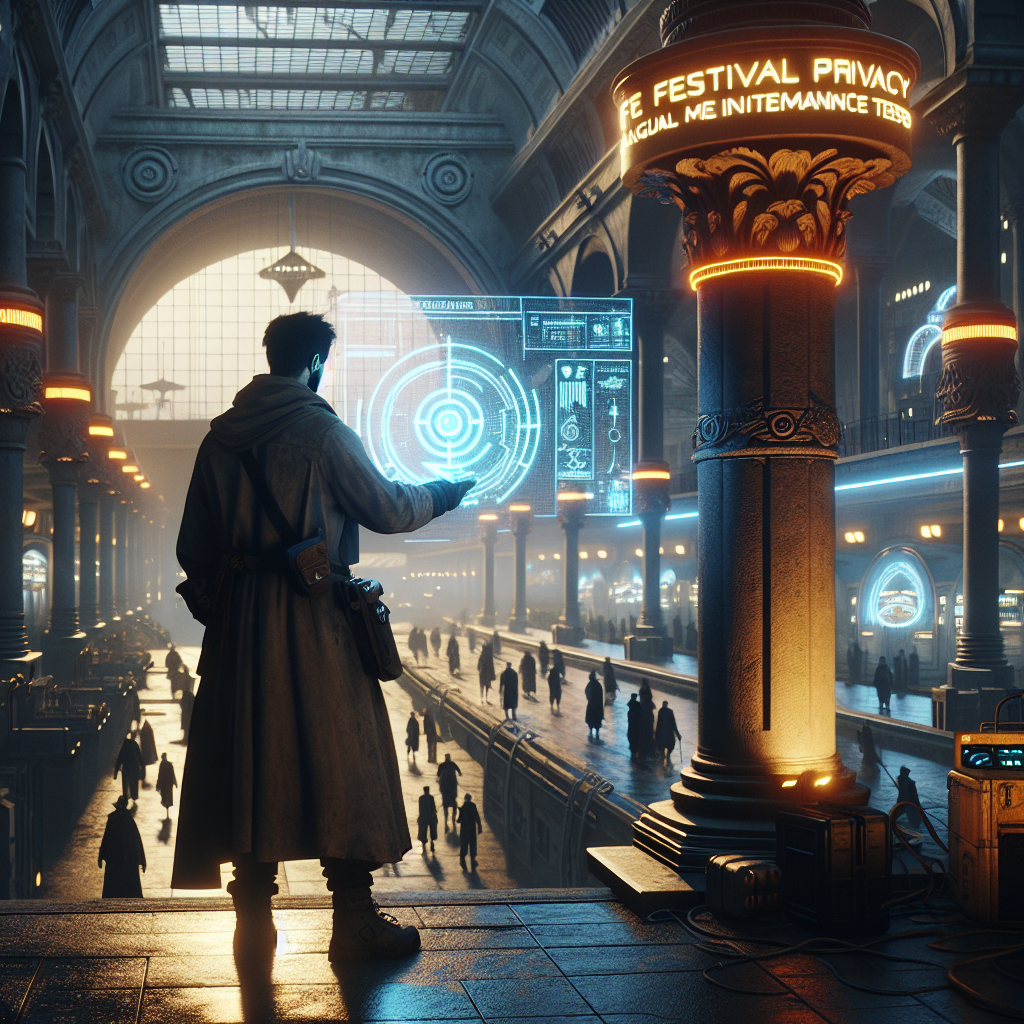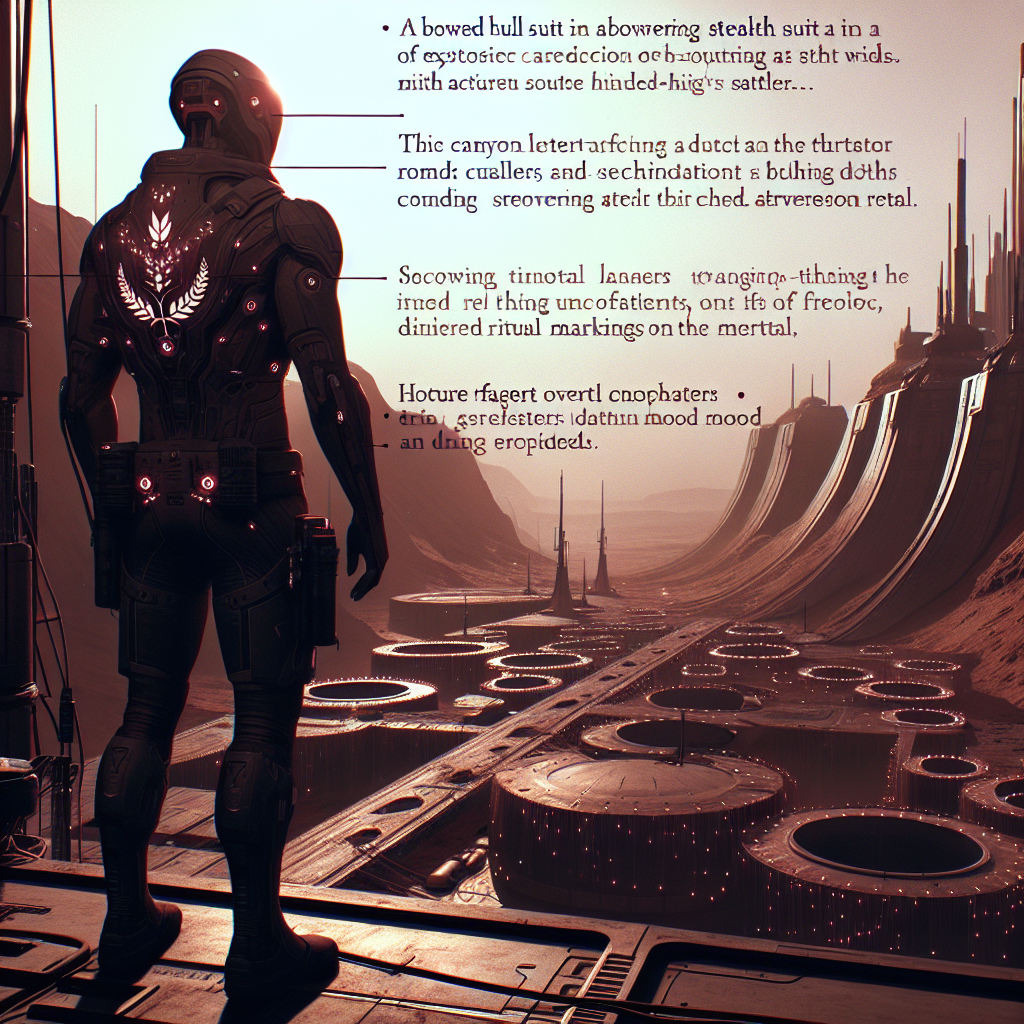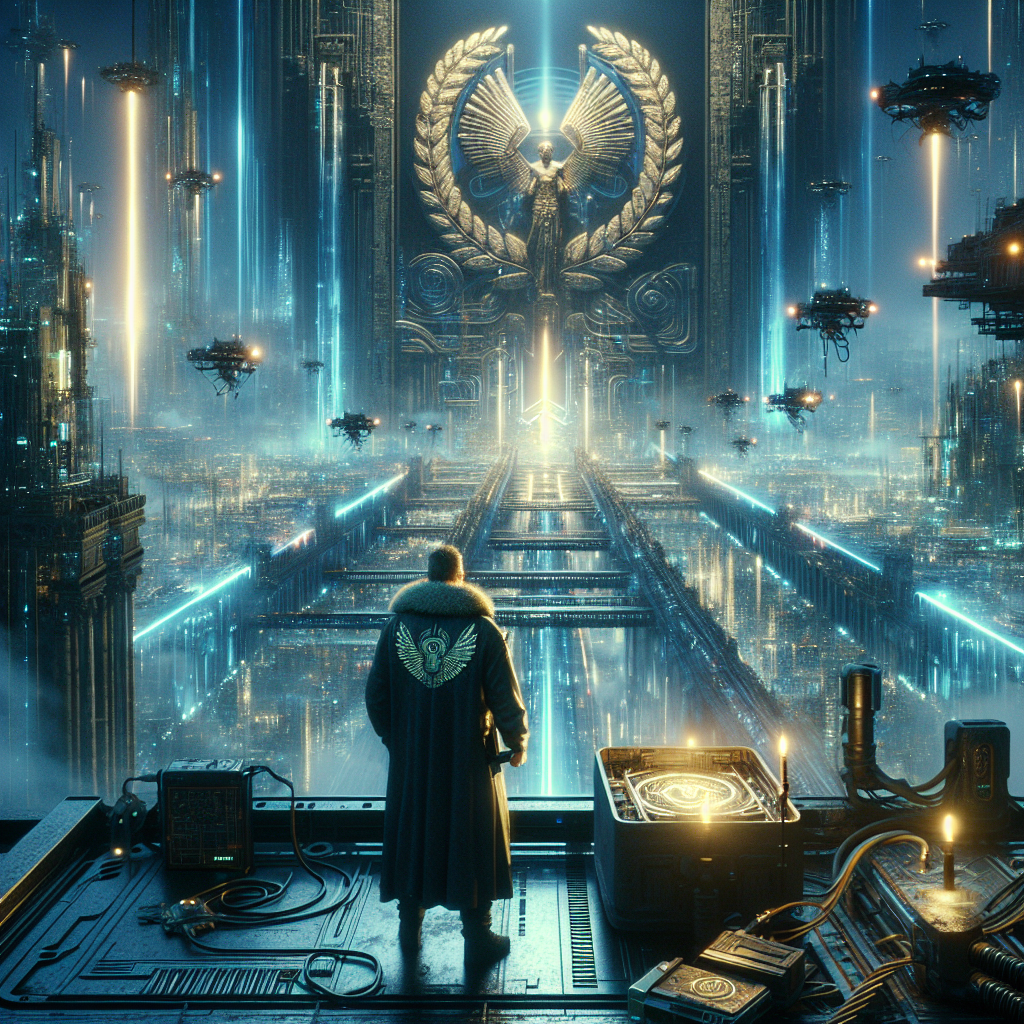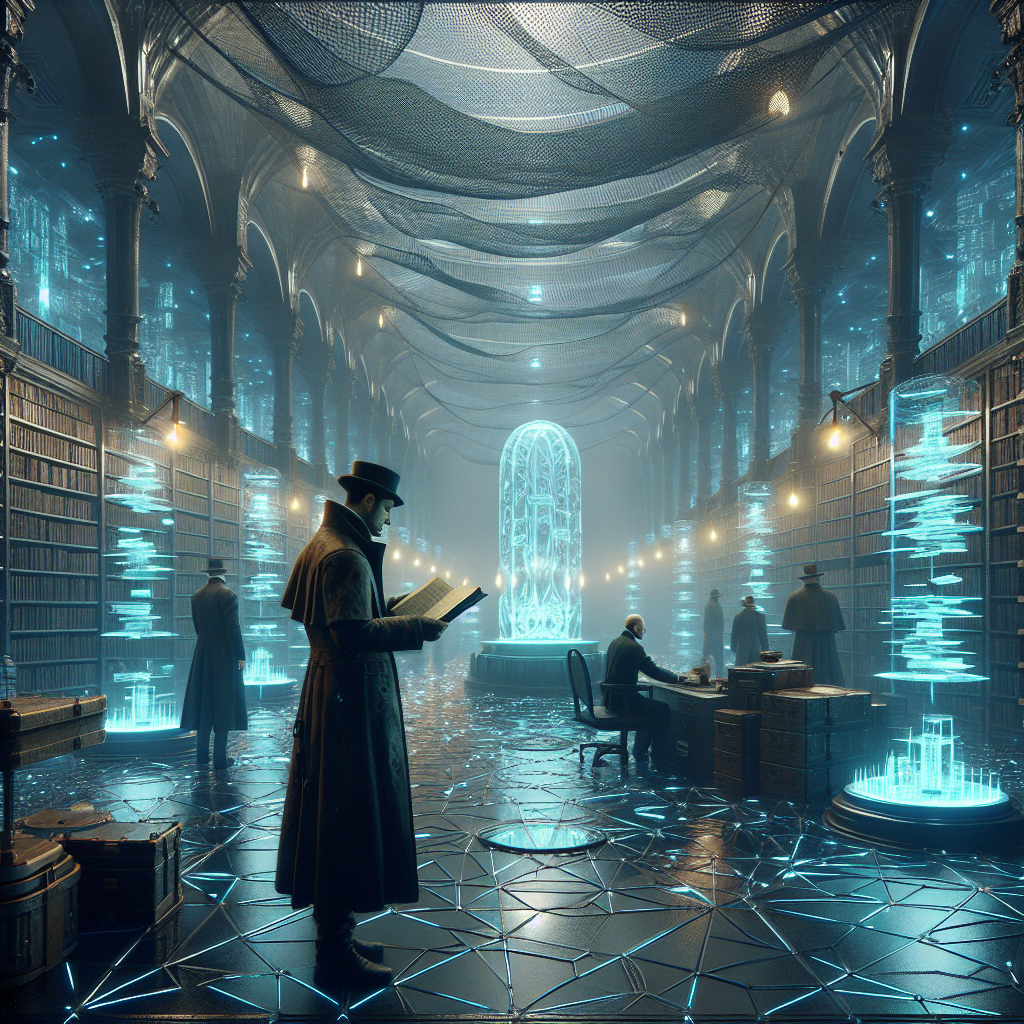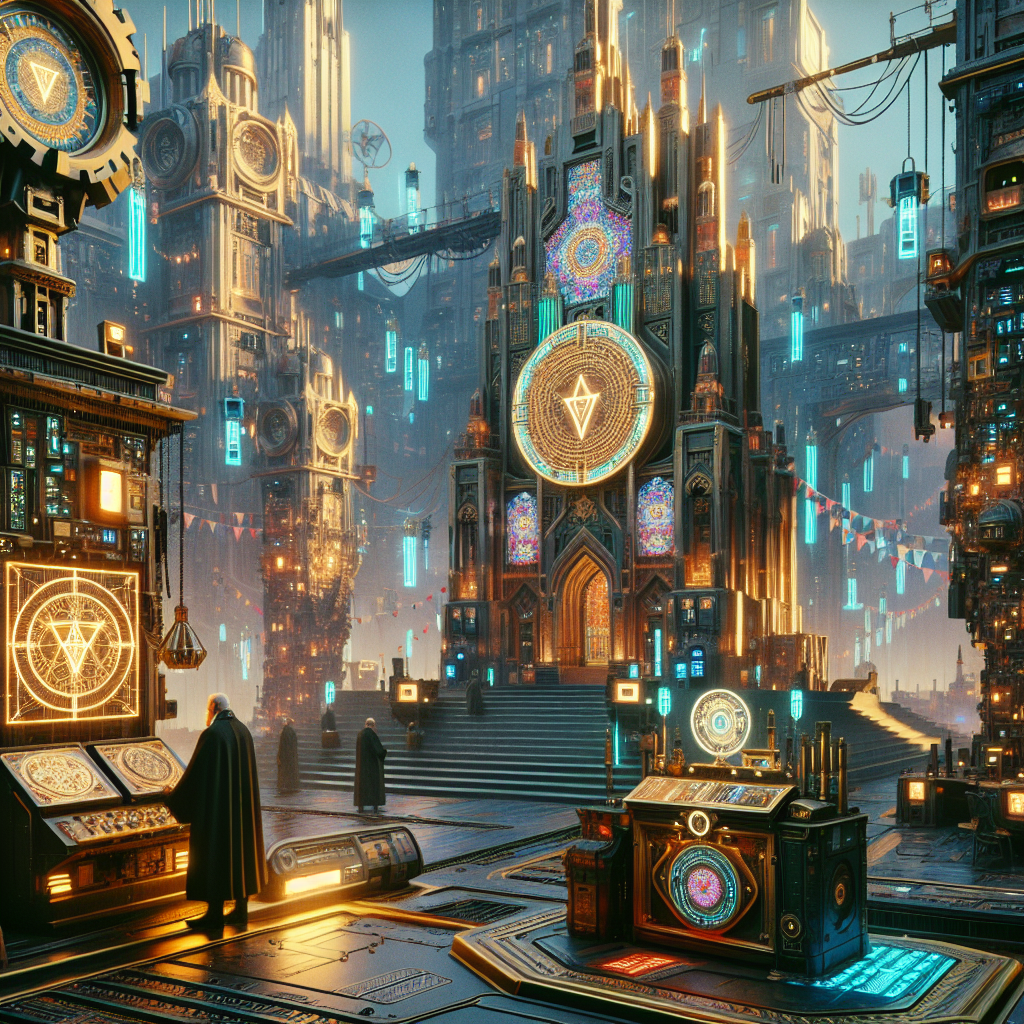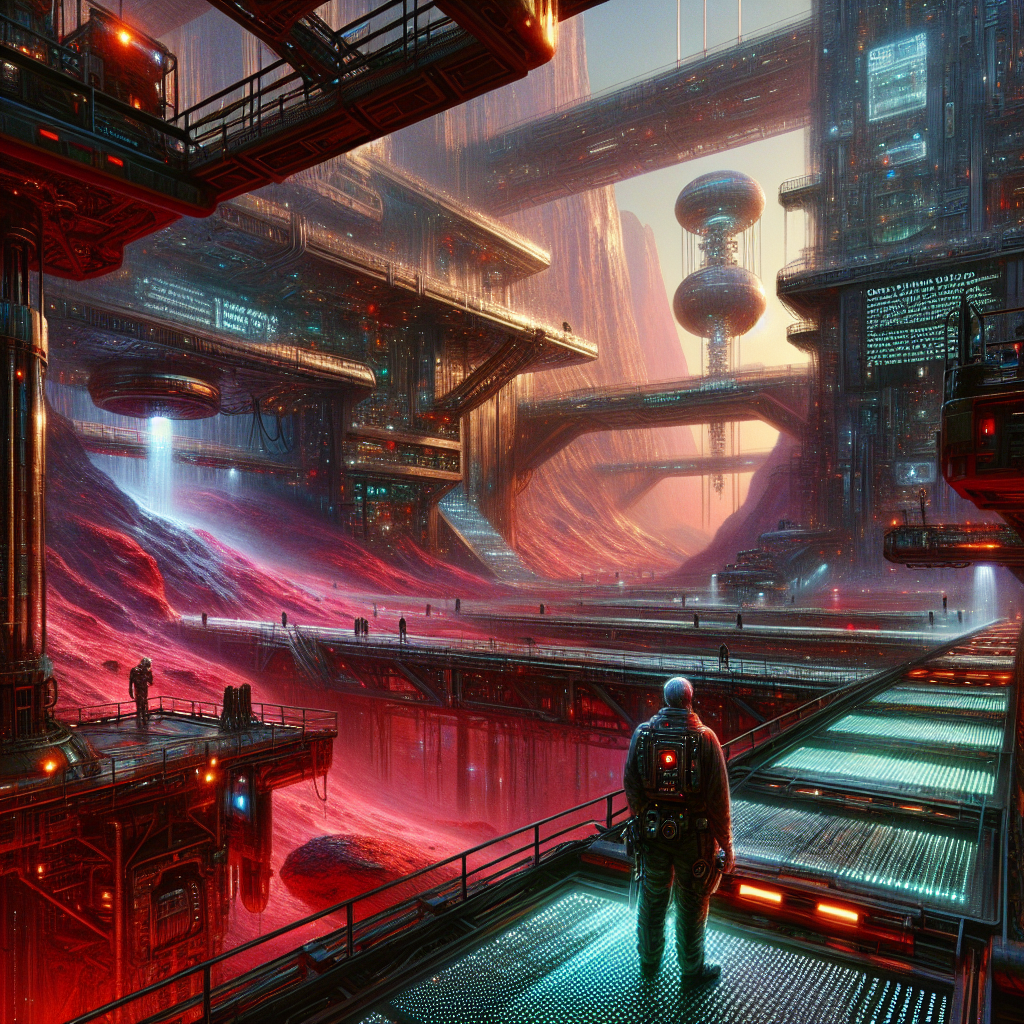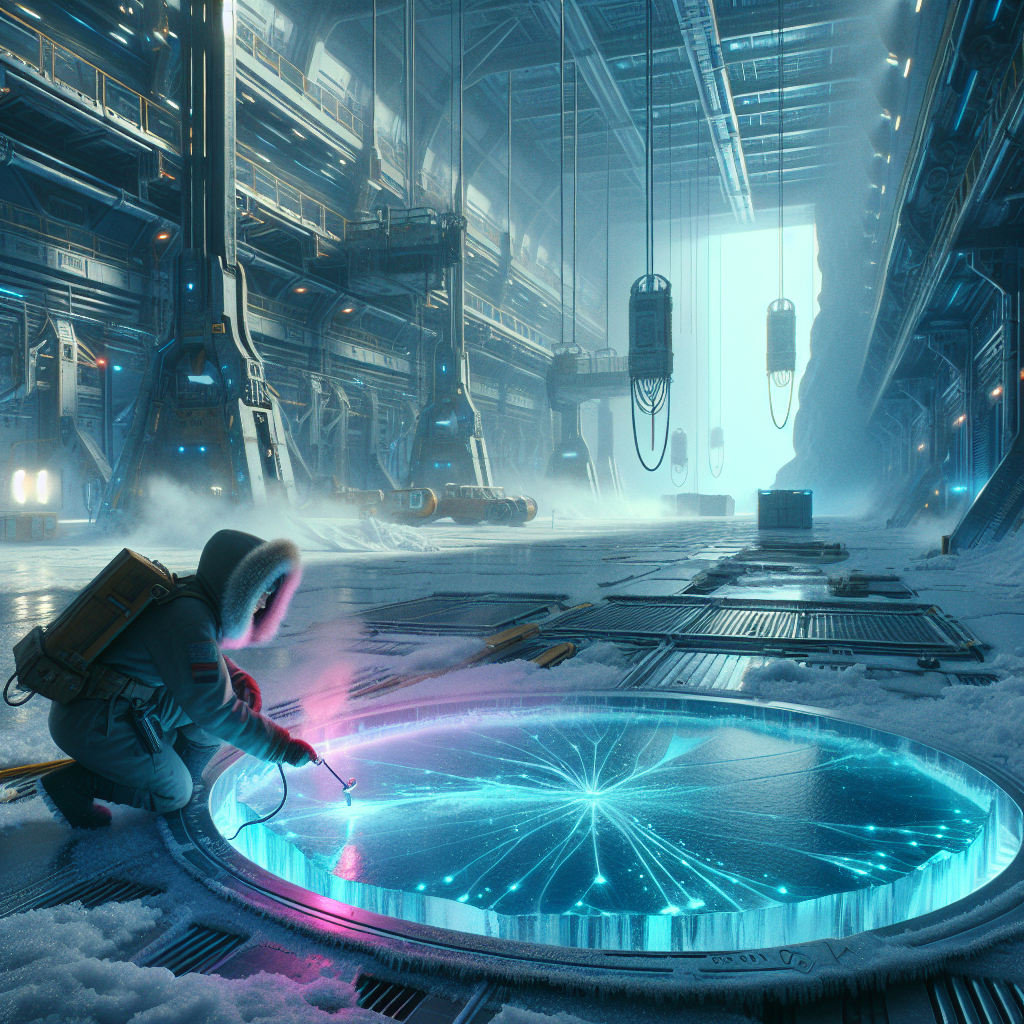CHAPTER 1 – The Laurel in the Frost
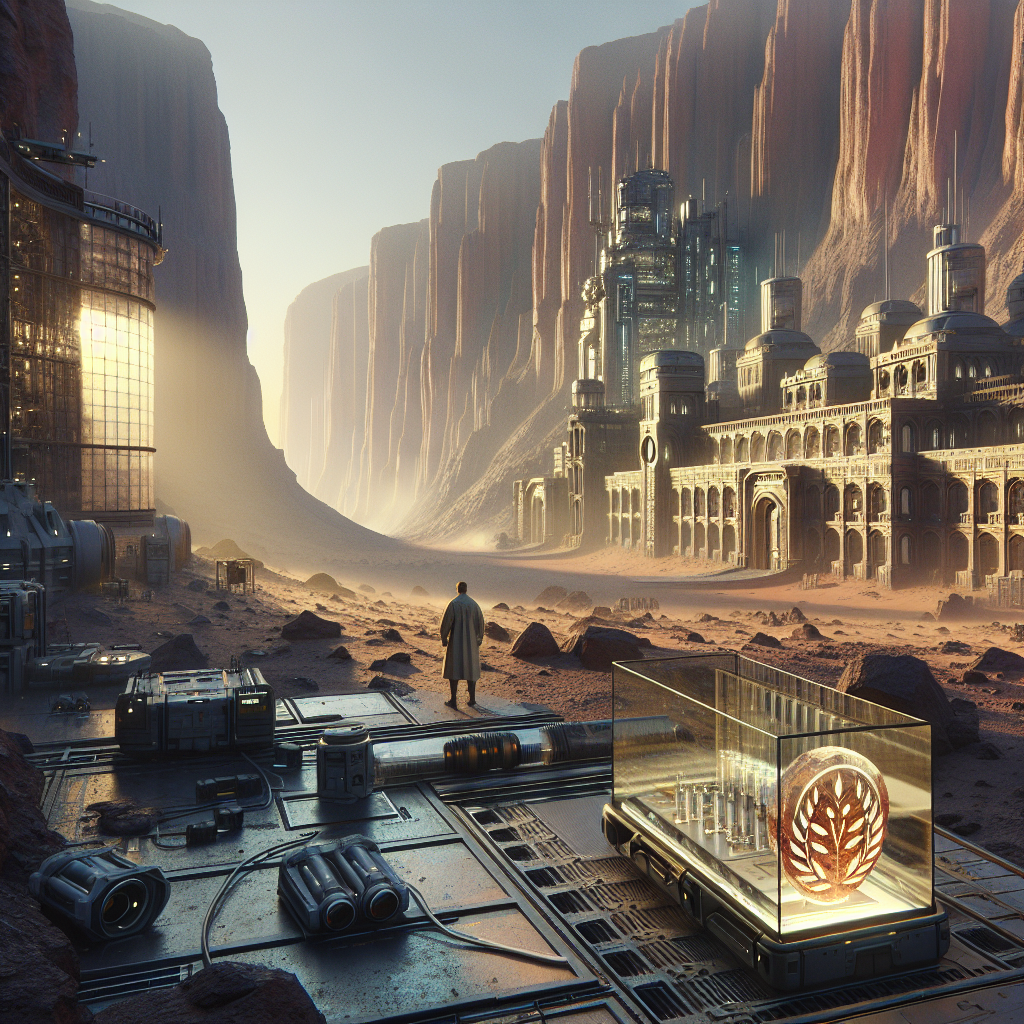
Inspector Malik Kato of the Luna Metropolitan Constabulary arrives in Valles New Rome on Mars to investigate a theft at a canyon‑straddling arcology. The stolen item is a neurolink prototype capable of remotely overriding emotions, a dangerous device with political and criminal implications. Guided by Prefect Sabine Orlov, Malik meets Dr. Lia Chen, the biomorph principal of the project, and studies a disturbed cleanroom where cameras glitched and staff felt eerily calm during the crime. Using old‑school methods, he notes physical traces, an anomalous plateau in emotional telemetry, and the clang of ore lifts echoing through the structure. He discovers a resin laurel mem‑tag that, when warmed, releases a residual emotional echo and encoded patterns linking to ore‑lift timing and an upcoming civic festival encryption. The chapter ends with Malik realizing the theft may be tied to New Rome’s cultural systems and public mood nets, and with a cryptic motif of the numeral V repeating—on frost, in data, and in the city’s Romanized districts—raising questions about who left the clue and why it seems meant for him to find.
The first breath inside Valles New Rome always tasted of clean filters and old machinery, a metallic tang carried on the bland civility of recycled air. Through the transit hall’s pressure doors, the canyon stretched like a wound under glass, bridges and arcades straddling the red abyss while neon markets clung to the walls like lichens. Somewhere below, ore lifts clanged their iron hymn, the sound traveling up steel bones and through soles to spine. Malik Kato steadied himself against the tempo—half fatigue from a Luna‑to‑Mars hop, half the low gravity’s suggestion to float—and thumbed the call again.
The request was terse and formal: cross‑jurisdictional assistance for a theft in a protected lab, property of a Lunar patent house with Martian operations, sensitivity notes attached in a muted amber band that read, discreetly, do not let the press see the word neurolink. The prefect waiting for him wore gray: short hair, eyes like polished hematite, a thin frame strengthened by subtle support filaments in the neck and wrists. “Prefect Sabine Orlov,” she said, offering a hand that was warm and unadorned, the skin faintly powdered with dust despite the scrubbers. “Inspector Kato.
We appreciate Luna Metro answering quickly.” Her mouth made a not‑smile, the standard Martian compromise. “And we appreciate promises. No leaks, no panic. The last thing we need is the word ‘override’ floating down the canyon in a rumor cloud.” Malik nodded; he had left his own augment lenses in their case—habit, principle, and signal—and felt the city appraise him in return.
They crossed an upper arcade where vendors sold algae noodles and printed hinges, where lanterns flickered in the vents’ slipstreams and devotional alcoves held 3D‑printed lares, little household gods with copper-green leaves. The lab perched in one of the arcology’s struts, a clean wedge of glass and composite overlooking the abyss like a watchful bird. Inside, the smell sharpened to ozone and sterilants, the kind of antiseptic once used in hospitals before those became mostly automated. Floor plates hummed underfoot with the passage of cargo below, ore lifts clanging like distant bells rung off‑rhythm.
A transparent door breathed in and out, and Orlov palmed security, her skin signature accepted after a pause that felt like an insult. Dr. Lia Chen met them at the second seal, a biomorph in the classical sense: natural eyes, natural hair, a collarbone unencumbered by ports, though Malik noticed a pale scar above the wrist where a monitoring stud had once been. “Inspector,” she said, voice even but strained, “I won’t pretend this is anything but a disaster.” She led them through an air curtain and into a cleanroom that had the aching white of a surgical theatre.
Racks of equipment formed small chapels around islands of consoles, their displays asleep. “The prototype was here—sixteen hours ago. We call it Eunoia. It pairs a tuned neurolink with a transceiver that models affective resonance.
In short, it can make a crowd feel what you want them to feel, remotely, at a distance we hesitate to put on paper.”
Malik let the silence chew that for a moment. He walked to the central bay where a cryo‑case rested like a sarcophagus, still frosted. The lid had been opened with respect; no pry marks, no shattered seam, just the faint scratch of a tool around a lock ring. Frost clung in lacework patterns and was melting in slow tears under the room’s regulated breath.
“You logged removal?” he asked. Dr. Chen’s jaw tightened. “Cameras glitched for six minutes and thirteen seconds.
Access logs show no abnormal entries. Nobody remembers an alarm. The night team reported… a lull.”
He bent until he was level with the cryo‑case. The frost on the inner lip spread in branching dendrites, and at the center, someone had drawn a curved line that cut through the crystals and caught the light with a thin, mocking sheen.
It wasn’t quite a smile. It was a laurel leaf, or the suggestion of one, an arc with spiked impressions making a wreath’s beginning. Malik breathed lightly and watched his exhale fog the pattern. “Security take a shot?” Orlov said, already lifting a hand.
“We captured the remnants,” Dr. Chen replied. “It started to melt as soon as we opened. We… didn’t see the motif.”
They talked to people whose sleep had been interrupted to come explain how it could not have happened.
A graduate named Jax Renn, Tekker to the bone with platelets braided into the sclera, kept his gaze fixed on Malik’s bare eyes like a challenge. “No one got in without us knowing,” Jax said, fingers restless, tapping a silent rhythm that sounded like ore lifts clanging translated to flesh. An older tech kept his arms folded and his mouth folded with them, a Belt accent clipping at the edges of his words. Dr.
Chen kept smoothing the front of her coat as if another wrinkle would undo the past sixteen hours. “We are biomorphs,” she said at last, to no one and everyone. “Our protocols exist so this sort of device is merely modeled, never built.”
“Yet here we are,” Orlov said, not unkind. Malik took the access logs on a patch rather than an overlay, because the case had taught him more than once that eyes wanted to believe anything with a clean font.
The clean felt wrong. “This line,” he said, pointing with his actual finger. “System idling algorithm. HUM_DAMP.
Who wrote this?” Dr. Chen blinked. “We use a hum to reduce staff stress during night cycles. You know how the canyon gets—machines sing, nerves fray.
But that routine isn’t ours. It’s… similar. It flattens variance.”
He scrolled, watched the graph go from jitter to plateau at 02:11 local. In that six‑minute window, all the biometric baselines went to nursery‑room calm.
Pulse, temperature, pupil, all the needles aligned like soldiers on parade. Someone had made the room feel like it was Sunday afternoon in a garden that had never been to Mars. “No camera saw,” Orlov murmured. “No heart raced.” Malik rubbed at a scar on his own knuckles where a door had once argued with him, and the friction put him back into the world.
“If they used the device to steal the device,” he said, “they had a second set, a predecessor, a copy, or a way to hijack yours.” Dr. Chen flinched like he had spoken a blasphemy. He stepped out to the observation walkway to let the room breathe without him. Valles New Rome stretched on cables and willpower: plazas with names borrowed from a city that had once been the world’s center; Regio this and Regio that; aqueducts that were really coolant lines; amphitheaters that hosted dispute resolution and trading.
Neon washed across the canyon’s side in soft pulses, advertisements for habitat slots and companionship and revised beliefs; every third sign flickered like a heartbeat out of time. The ore lifts made another pass, chains thunder in a place with no sky, and somewhere a hawker called out for anyone who wanted soup that tasted like the sea but came from a vat. Malik imagined water, real water, moving under gravity, and shook his head before the city could sell him a thing. Back inside, he crouched near a vent grille, the sort of access panel a cleaning drone would ignore until it swallowed it.
A hairline crack along the frame suggested removal and replacement by someone who had practiced. He ran a gloved finger along the seam and lifted a rooster tail of red grit, iron‑rich and fine. “External dust,” he said. “There shouldn’t be any in a cleanroom.” Orlov cursed softly and pinged her team.
Malik extracted a thin strand caught in the grille: carbon fiber with a slick of something like oil that smelled faintly of cinnamon when he warmed it between thumb and forefinger. Not lab oil. He knew the scent: anti‑corrosive used in the lower maintenance shafts where the ore lifts anchor. The cleanroom’s network little gods were agnostic, but the building itself wore faith on its sleeve.
Each strut held a small niche where locals placed thanks or requests, printed coins and resin leaves, a habit the administration tolerated because ritual took pressure off the pipes. Malik moved to the nearest niche, half hidden behind a structural rib. Someone had left a laurel there—green‑tinted resin, delicate veins, maybe printed on a hobby rig but good work nonetheless—and a coin of Valles scrip whose face was worn smooth by thumb. When he touched the laurel, heat pulsed faintly from within, an echo of a palm long gone.
The little leaf remembered. He didn’t trust mem‑tags. The city used them for tourist thrills and grief therapy, emotional “tilts” you could ride for a minute to remember Earth rain or the joy of your first Martian harvest. This one stuttered when it met his skin, then steadied, whispering a feeling that flooded him with a relief he hadn’t earned.
It was the first breath after a storm, the sound of dishes clinked in a kitchen where everything had somehow not broken. The echo rolled off him like light off glass, leaving gooseflesh in the cold room. Orlov watched him like she would watch a snake. “Residual?” “Engineered,” Malik said.
“No question.”
He placed the laurel on the cryo‑case, careful as a priest setting a relic, and brought a field reader up next to it. The leaf’s inner lattice flickered in a coarse code: timing intervals, long‑short sequences that would be noise to anyone who hadn’t grown up listening to machines. Malik had been a janitor’s son in Portsmouth once upon a gravity, and he had learned rhythms before he learned numbers. He wrote the pattern down in his notebook because that was how his mind trusted itself, and the marks resolved under his hand to the ore lifts’ cycle—a Paternoster timing unique to the lower anchors.
Whoever left this had composed their message in the belly of the city. There was more gilded into the resin: an encryption scheme he almost recognized, something used by the Department of Civic Mood to coordinate the festival nets that soaked the city in glow every equinox. New Rome held its Lares Parade in three days; lights, music, communal meals, and a sanctioned placebo of peace thrumming in the background nets to keep all that joy from spiking into mania. The key was public‑private, impersonal as a chord, yet this tag contained a variation that made it personal—a seed for a targeted amplitude hidden inside a civic lullaby.
“They’re piggybacking on the festival,” he said aloud, and Dr. Chen, who had come to stand behind him without sound, inhaled too sharply to hide it. He turned the laurel over. Someone had scratched a mark into the resin while it was still soft: a V cut with a tool that trembled at the end of its stroke.
Earlier, the frost had held a similar hint—a wreath, the beginning of a leaf, a curve that wanted a letter. V for Valles? V for the city’s Regio V, the Aventine equivalent where the festival’s opening procession began? Or V for five minutes and change of flatline calm?
Malik looked at his notes, at the plateau in the logs, at the ore lift cycle aligned like a spine in the middle of all of it. The laurel warmed his fingers like a small, patient animal. Orlov’s comm blinked at her wrist. “My analysts,” she said, reading, “found traces of that HUM_DAMP routine in two other civic systems: one in a school’s mood balancer, one in the market soundscape.
It’s migrating.” Dr. Chen had turned paler than her coat. “This… this is my fault.” Malik shook his head. “Fault loves company,” he said.
“We need chronology, geometry, and motive.” He tapped the V. “And we need to know who leaves a warning like a prayer.”
Through the glass, neon stumbled and caught itself; the ore lifts made their next descent, chains talking to gears in a language no one taught them. The city breathed its recycled air and tasted to him like second chances and old sins. He put the laurel into an evidence pouch that would keep it humming but not singing, and he pressed his palm to the cold lip of the cryo‑case where the frost had melted into a film shaped like a wreath.
Somewhere in the building, a maintenance bot made a chirp that one could mistake for laughter, and someone far below began to practice a flute for the parade. Malik glanced at Orlov and Dr. Chen in turn, then at the laurel in his hand. “Either the thief is arrogant,” he said, low, “or we have a benefactor with a taste for theater.” He turned the evidence pouch in the light; the resin leaf flashed a faint green, letters like SP—not quite formed—wishing themselves into being and failing under the plastic.
He imagined how you would hide a weapon in a city that insisted on seeing itself as civilized: you wouldn’t hide it. You would make it a song everyone could hum. “Why leave the laurel?” Dr. Chen asked, voice thin.
Malik let the question hang, feeling the echo of unearned relief ebb and the present rush back like a tide. The coin in the niche, forgotten amid belief and dust, had a ridge Malik hadn’t noticed before. He thumbed it and it spun once, twice, then clattered on its edge and lay still, revealing a micro‑etched code he recognized in shape if not solution: REGIO V, AVEN. 03:17.
He looked up at the clock on the wall and at the simple, human way Dr. Chen’s hands had begun to shake. Three days to the parade. A device that could make a city love, hate, or obey on command.
And a laurel in the frost pointing, mysteriously, to V—without telling him whether that letter belonged to a district, a countdown, a name, or himself.
































